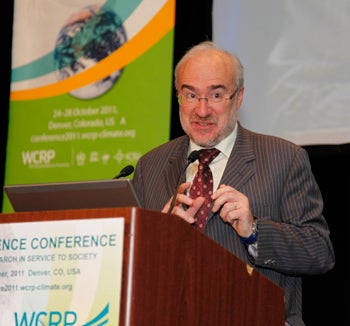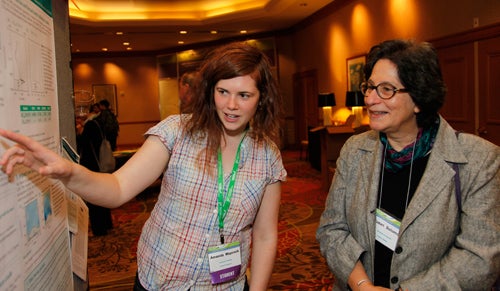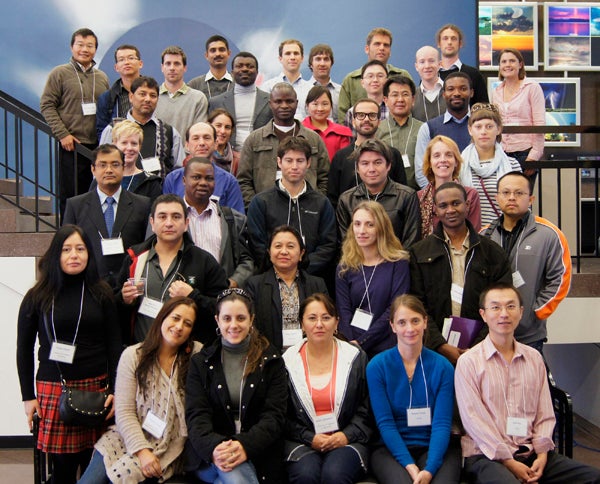A world’s worth of climate research
Scientists meet in Colorado for unique global forum
Nov 10, 2011 - by Staff
Nov 10, 2011 - by Staff
10 November 2011 • The weather in Denver on 24–28 October echoed the theme of the first-ever Open Science Conference of the World Climate Research Program (WCRP). As the meeting unfolded, conditions outside swung from record-warm readings of 80°F (27°C) to a wet snowfall.

Michel Jarraud, secretary general of the World Meteorological Society, discussed the WMO's perspective on climate research in service to society during a plenary session on 24 October. (Photo by Carlye Calvin.)
Understanding and predicting both climate variability and change—on all spatial and time scales—was the theme of the WCRP conference, which attracted more than 1,900 attendees from 86 countries. “It was a terrific success by all accounts,” says James Hurrell, the head of NCAR’s Earth System Laboratory and the lead organizer for the meeting.
The conference included morning plenaries from a Who’s Who of climate researchers, parallel sessions each afternoon, and wide-ranging poster sessions, all structured to foster discussion and dialogue.
“Many attendees and exhibitors commented that they really enjoyed the size and the format of the meeting,” says Jill Reisdorf, a project coordinator with UCP’s Joint Office for Science Support, which handled logistics for the meeting.
Among the goals of the meeting was to gather strategic input for the Fifth Assessment Report of the Intergovernmental Panel on Climate Change, which will be prepared over the next two to three years. The breadth and depth of the sessions on understanding and prediction made the meeting itself an assessment of climate research, says Hurrell. While WCRP sponsors a variety of targeted meetings, the Denver gathering was the first to bring together the international community involved in all aspects of its work.
The meeting drew more than 500 students and early-career scientists, many of whom were recognized for delivering outstanding papers and posters. More than 250 attendees hailed from developing countries in Africa, Asia, and Central and South America.
Before they dove into the WCRP meeting in Denver, 35 early-career scientists participated in a three-day workshop at NCAR on regional climate issues in developing countries. One of the main goals was to stimulate international partnerships that could address real-world needs.

Amanda Maycock (University of Reading) discusses her Open Science Conference poster with Susan Solomon (NOAA), who presented a talk on long-term anthropogenic climate change at the OSC's plenary session on 27 October. (Photo by Carlye Calvin.)
NCAR’s Early Career Scientist Assembly, chaired by Simone Tilmes, organized the event, hosted by the NCAR Advanced Study Program. Breakout sessions were led by ECSA steering committee members Lulin Xue, James Done, and Andrew Monaghan.
“The workshop brought so many young and energetic scientists from all over the world to share all kinds of interesting research related to climate change,” says Xue.
Done is part of a new section in NCAR’s Mesoscale and Microscale Meteorology Division that focuses on regional climate research. “This meeting was an education for me on how regional climate data are used,” he says.
One obstacle to better regional modeling is a continued dearth of data in many developing areas. This point stood out for Nigerian scientist Emiola Gbobaniyi (Africa Regional Centre for Space Science and Technology Education) when a speaker at the workshop referred to high pollution levels in Accra, Ghana.
“I wondered why Accra was on such a list and Lagos, one of Africa’s most populous and polluted megacities, was not,” says Gbobaniyi. “The answer was simple: the researchers had no data for Lagos.” By the meeting’s end, several participants were brainstorming an effort suggested by Tilmes to stimulate joint field campaigns for populous but undersampled regions such as the Lagos area.
Xue was inspired by the workshop’s emphasis on meeting user needs: “We, as scientists, should pay more attention to public requirements and spare no efforts to serve society.”

More than 30 early-career scientists from Africa, Asia, Europe, and the Americas convened for a three-day workshop at NCAR on regional climate and developing countries. (Photo by Kathleen Barney, NCAR.)